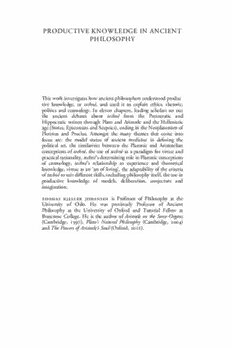Table Of ContentPRODUCTIVE KNOWLEDGE IN ANCIENT
PHILOSOPHY
Thisworkinvestigateshowancientphilosophersunderstoodproduc
tive knowledge, or technê, and used it to explain ethics, rhetoric,
politics and cosmology. In eleven chapters, leading scholars set out
the ancient debates about technê from the Presocratic and
Hippocratic writers through Plato and Aristotle and the Hellenistic
age(Stoics,EpicureansandSceptics),endingintheNeoplatonismof
Plotinus and Proclus. Amongst the many themes that come into
focus are: the model status of ancient medicine in defining the
political art, the similarities between the Platonic and Aristotelian
conceptions of technê, the use of technêas a paradigm for virtue and
practicalrationality,technê’sdeterminingroleinPlatonicconceptions
of cosmology, technê’s relationship to experience and theoretical
knowledge,virtueas an ‘art ofliving’,the adaptability ofthe criteria
oftechnêtosuitdifferentskills,includingphilosophyitself,theusein
productive knowledge of models, deliberation, conjecture and
imagination.
is Professor of Philosophy at the
University of Oslo. He was previously Professor of Ancient
Philosophy at the University of Oxford and Tutorial Fellow at
Brasenose College. He is the author of Aristotle on the Sense-Organs
(Cambridge, ), Plato's Natural Philosophy (Cambridge, )
and The Powers of Aristotle's Soul (Oxford,).
PRODUCTIVE KNOWLEDGE
IN ANCIENT PHILOSOPHY
The Concept of Technê
THOMAS KJELLER JOHANSEN
UniversityofOslo
UniversityPrintingHouse,Cambridge,UnitedKingdom
OneLibertyPlaza,thFloor,NewYork,,USA
WilliamstownRoad,PortMelbourne,,Australia
–,rdFloor,Plot,SplendorForum,JasolaDistrictCentre,NewDelhi–,India
AnsonRoad,#–/,Singapore
CambridgeUniversityPressispartoftheUniversityofCambridge.
ItfurtherstheUniversity’smissionbydisseminatingknowledgeinthepursuitof
education,learning,andresearchatthehighestinternationallevelsofexcellence.
www.cambridge.org
Informationonthistitle:www.cambridge.org/
:./
©CambridgeUniversityPress
Thispublicationisincopyright.Subjecttostatutoryexception
andtotheprovisionsofrelevantcollectivelicensingagreements,
noreproductionofanypartmaytakeplacewithoutthewritten
permissionofCambridgeUniversityPress.
Firstpublished
AcataloguerecordforthispublicationisavailablefromtheBritishLibrary.
----Hardback
CambridgeUniversityPresshasnoresponsibilityforthepersistenceoraccuracy
ofURLsforexternalorthird-partyinternetwebsitesreferredtointhispublication
anddoesnotguaranteethatanycontentonsuchwebsitesis,orwillremain,
accurateorappropriate.
Contents
List of Contributors page vii
Acknowledgements viii
List of Abbreviations ix
Introduction
ThomasKjeller Johansen
Protagoras on Political Technê
Edward Hussey
Dynamic Modalities and Teleological Agency: Plato and
Aristotle on Skill and Ability
Tamer Nawar
Technê As a Model for Virtue in Plato
Rachel Barney
Crafting the Cosmos: Plato on the Limitations of Divine
Craftsmanship
Thomas KjellerJohansen
Aristotle on Productive Understanding and Completeness
Ursula Coope
Technê and Empeiria: Aristotle on Practical Knowledge
Robert Bolton
The Stoics on Technê and the Technai
Voula Tsouna
The Epicureans on Technê and the Technai
Voula Tsouna
v
vi Contents
The Sceptic’s Art: Varieties of Expertise in Sextus Empiricus
Stefan Sienkiewicz
Plotinus on the Arts
Eyjólfur Kjalar Emilsson
Productive Knowledge in Proclus
Jan Opsomer
Bibliography
General Index
Index Locorum
Contributors
, Professor of Philosophy and Classics, University of
Toronto
, Professor of Philosophy, Rutgers University
, Professor of Ancient Philosophy, University of Oxford
ó ,ProfessorofPhilosophy,UniversityofOslo
, Emeritus Fellow, All Souls College, Oxford
, Professor of Philosophy, University of
Oslo
, Assistant Professor of Philosophy, University of
Groningen
, Professor of Philosophy, University of Leuven
, Lecturer in Ancient Philosophy, The Queen’s
College, Oxford
, Professor of Philosophy, UC Santa Barbara
vii
Acknowledgements
Thechaptersinthisvolume,withtheexceptionsofthosebyVoulaTsouna
andThomasKjellerJohansen,derivefrompapersdeliveredataconference
on ‘Technê in Ancient Philosophy’ held in Oxford in August . The
conference was kindly sponsored by the Mind Association, the John Fell
Fund and the University of Oxford. Thanks also to Panagiotis Pavlos for
compiling the Index Locorum.
viii
List of Abbreviations
Collections of Ancient Texts
SVF: Arnim,H.von(ed.)–.Stoicorumveterumfragmenta,
vols. Leipzig: Teubner.
DK: Diels,H.,andKranz,W..DieFragmentederVorsokratiker,
th ed. Berlin: Weidmannsche Verlagsbuchhandlung.
LM: Laks, A.,and Most, G. W. . Early Greek Philosophy, vols,
Loeb Series. Cambridge, MA: Harvard University Press.
PHerc.: Papyri Herculanenses, for which, see Gigante, M. . Catalogo
dei papyri ercolanesi. Naples: Bibliopolis; Capasso, M. .
Manuale di papirologia ercolanese. Lecce: Università degli studi
di Lecce.
Ancient Texts
Alexander of Aphrodisias
Quaest. Quaestiones Questions
Anonymous
inTheaet. Commentarius inPlatonis Commentary on Plato’s
Theaetetum Theaetetus
Aristotle
DA DeAnima On the Soul
DC DeCaelo On the Heavens
EE Ethica Eudemia Eudemian Ethics
EN Ethica Nicomachea Nicomachean Ethics
GA DeGeneratione Animalium Generation of Animals
ix
x List of Abbreviations
GC De Generatione et Corruptione On Generation and Corruption
HA Historia Animalium History of Animals
Int. De Interpretatione On Interpretation
Juv. De Iuventuteet Senectute On Youthand Old Age
MA De Motu Animalium Movement of Animals
Mem. De Memoria On Memory
Metaph. Metaphysica Metaphysics
PA De Partibus Animalium Parts of Animals
Ph. Physica Physics
Pol. Politica Politics
Post An Analytica Posteriora Posterior Analytics
Pr An Analytica Priora PriorAnalytics
Rhet. Rhetorica Rhetoric
SE SophisticiElenchi Sophistical Refutations
Sens. De Sensu et Sensibilibus On Sense and Sense Objects
Top. Topica Topics
Asclepius
in Met. InAristotelis Metaphysicorum On Aristotle’s Metaphysics,BooksA Z
libros A ZCommentaria
Augustine
De civ. Dei Decivitate Dei The Cityof God
Cicero
Acad. Academica Academics
De Div. De Divinatione On Divination
De Fin. De Finibus On Ends
De Inv. De Inventione On Invention
De Off. De Officiis On Duties
De Or. De Oratore On the Orator
ND De Natura Deorum On the Nature of the Gods
Acad.post. Academica Posteriora Posterior Academics
Damascius (Dam.)
In Phil. in Platonis Philebum commentarius On Plato’s Philebus
Diogenes Laertius (D.L.)
VF Vitae Philosophorum Lives of the EminentPhilosophers
List of Abbreviations xi
Epictetus
Disc. Dissertationes Discourses
Epicurus
KD Kuriai Doxai Principal Doctrines
ad. Men. Epistula ad Menoeceum Letter toMenoeceus
ad. Herod. Epistula ad Herodotum Letter toHerodotus
ad Pyth. Epistula ad Pythoclem Letter toPythocles
De Nat. De Natura On Nature
Erotian
Gloss. Vocum Hippocraticarum collectio Glossary of Hippocratic Words
Hippocr.
Eusebius
praep. Evang. Praeparatio Evangelica Preparation for the Gospel
Galen
Contr.Lyc. AdversusLycum Against Lycus
defin. Medicae Definitiones medicae Medical Definitions
method med. De methodo medendi Method of Healing
sect. ingred. De sectis ingredientibus On Sects for Beginners
Hippocrates
Art. DeArte On the Art
Loc. Hom. DeLocisin Homine Places in Man
Nat. Hom. DeNatura Hominis Nature of Man
VM DeVetere Medicina On Ancient Medicine
Vict. DeVictu Regimen
Homer
Il. Ilias Iliad
Iamblichus
Myst. DeMysteriis Aegyptiorum On the Egyptian Mysteries
Marcus Aurelius
Med. Meditationes Meditations

